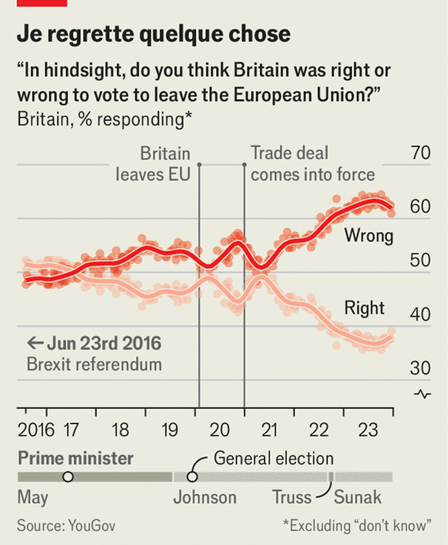A majority of British voters now believe the split was a mistake
Apr 11th 2024| (The Economist)
It is rare for voters to change their minds soon after referendums. Experience
from Canada to Scotland, from Norway to Switzerland, suggests rather that
opinions tend to move in favour of a referendum result more than they swing
against it. But Brexit seems to be an exception. Since the 52-48% vote in
favour of leaving the European Union in June 2016, the majority view among
Britons has shifted, and especially so in the past two years, towards the
conclusion that the decision was wrong (see chart).
One way to
take the temperature is to visit two English towns called Richmond which voted
in very different ways in 2016. In Richmond-upon-Thames in London, which voted
69-31% to remain in the eu, opinion has hardened. Gareth Roberts, the Liberal
Democrat council leader, notes that post-Brexit niggles such as longer border
delays and more intrusive passport controls have helped to solidify local
opposition. A Leave voter sitting by the river says he has not changed his
mind, but that he is disappointed by the Tories’ failure to strike big trade
deals outside the eu.
The other
Richmond, in north Yorkshire, voted 57-43% for Brexit. One Leaver in the market
square echoes his southern counterpart by insisting that he still supports
Brexit but he complains that it has not been properly done and that immigration
has surged despite repeated Tory promises to reduce it. A local bartender says
that she voted instinctively to leave but that, were the referendum re-run, she
would work harder to understand what it would really mean. Stuart Parsons, a
former mayor of Richmond, claims that several friends have changed their minds,
especially small farmers who feel betrayed by the Conservatives and now fret
about future lost public subsidies.
Such
anecdotes chime with polls across the country. Research by uk in a Changing Europe (ukice), a think-tank, finds that most voters have not in fact changed their
minds since 2016. But because as many as 16-20% of those who voted to leave
have switched sides, compared with only 6% of those who voted to remain, the
balance has swung against Brexit. The passage of time is also having its
inevitable effect: older voters were overwhelmingly keen to leave the eu and younger ones were fiercely opposed to the idea. Don’t-knows and
those who did not vote in 2016 now tend to break strongly against Brexit.
Explanations
abound for the disillusionment. Sir John Curtice, a leading pollster who works
with ukice, points especially to gloom about the economy since 2016, which he says matters more than irritation over
immigration. Sarah Olney, the Liberal Democrat mp for Richmond Park, reckons that outright dishonesty on the part of
the Leave campaign is to blame. Peter Kellner, a political pundit and former
president of YouGov, a polling group, suggests that many Brexit supporters had
no idea what would happen if they actually won. That differs sharply from the
run-up to most other constitutional referendums.
Changes in
the political background matter as well. The Conservatives under Rishi Sunak,
who happens to be the mp for Richmond in Yorkshire and is a keen
supporter of Brexit, are associated in voters’ minds with the decision to
Leave. Party disunity and the chaos of four prime ministers in five years have
helped to discredit something with which the Tories are strongly identified.
Just as the
Tories have helped tarnish views of Brexit, so Brexit is likely to hurt the
Tories at the next election. A chunk of people who voted Leave in 2016 say
there should still be long-term benefits from quitting the bloc but argue that
too little has been done to realise them. This group now leans against the
Tories and may even prefer the Reform Party, an insurgent right-wing party. In contrast, those who were against Brexit
in 2016 think they were right to fear its economic impact; many who were Tory
then now back Labour.
The
anti-Brexit mood of a majority of voters is clear but that does not translate
into a burning wish to refight old battles. Brexit may be unpopular but its
political salience has faded. Even keen Remainers have doubts about the wisdom
of starting a lengthy campaign to rejoin. The Labour Party’s decision to talk
as little as possible about Brexit is understandable: the party hopes to regain
“red-wall” seats in the north and the Midlands that backed Brexit in 2016 and
then voted Tory in the 2019 general election.
But if and
when Labour does take office, there will be political wriggle-room to improve relations with the eu. Some in the party talk not just of expanding today’s
thin trade deal but of broader alignment with European rules. Tory attacks on
such ideas as a betrayal of the 2016 vote are less likely to resonate when
Brexit itself has lost its appeal for many.■

